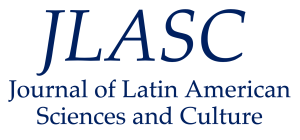Un estudio preliminar de la relación entre la ideología elegante china y la movilización ambiental
Desde la postura de vida de los eruditos en la dinastía Tang y Song hasta el despertar de la conciencia ambiental
DOI:
https://doi.org/10.52428/27888991.v3i4.185Palabras clave:
Conciencia ambiental, Estilo de vida, Estudios eruditos, Ideologúa elegante china, Movilización ambientalResumen
Este estudio investigó la relación entre la “ideología elegante china” y la movilización ambiental para explorar una nueva posibilidad de despertar la conciencia para la protección ambiental. El autor consideró la postura de vida de los eruditos en las dinastías Tang y Song. Transmitió una demanda por la herencia de ideas y civilizaciones, así como una orientación de vida elegante y sostenible. El estudio identificará aún más la orientación práctica de la ideología cultura para los movimientos ambientales al considerar las causas y los factores influyentes de la movilización ambiental en la sociedad moderna. Obtener un equilibrio entre la integración natural y social. La elegante dinámica de vida de la dinastía Tang y Song construirá una interacción entre la naturaleza y el comportamiento social humano dominante, lo que reduce drásticamente la segregación y la que reduce la contradicción entre la integración social y natural. Este estudio abogará una “nueva forma” sostenible y contraída que atraiga a los espíritus humanos mediante el estudio de la selección de los estudios emitidos en la dinastías Tang y Song.
Descargas
Citas
Bai, Juyi. (Tang, 800 A.D.). Ren Zhi Kun You Jun Zhi She Yu.
Brusco, S. (1982). The emilian model: productive decentralisation and social integration. Cambridge Journal of Economics, 6(2), 167-184.
Changsun, Wuji. (1933). Tang law. Business Printing Press.
Chen, Shaoming. (2005). Gentleman and Politics -- an interpretation of the chapter "master is Wei Jun" in the Analects of Confucius. Journal of Sun Yatsen University: Social Science Edition, 45 (4), 7-13
Chen, Yuanshu. (2010). Research on environmental protection communication behavior and effect of environmental protection NGOs in China.
Fan, Zhongyan. (Song 1043 A.D.). Yue Yang Lou Ji.
Fei, Ai. (2016). People's Daily Opinion: Tan Feng Ya. People’s Daily. http://opinion.people.com.cn/n1/2016/1118/c1003-28877403.html
Ferree, M. M., & Miller, F. D. (1985). Mobilization and meaning toward an integration of social movements. Sociological Inquiry, 55(1).
Ferree, M. M., & Miller, F. D. (1985). Mobilization and meaning toward an integration of social movements. Sociological Inquiry, 55(1).
He, Kunqian. (2016). In the tang and song dynasties thought of sustainable development (a master's degree thesis, Shanxi university of finance and economics). https://kns.cnki.net/KCMS/detail/detail.aspx?dbname=CMFD201701&filename=1016102148.nh
ILO. Education and social mobilizati xon.
Knechtges, David R. (1982). Selections of Refined Literature: Volume 1: Rhapsodies on Metropolises and Capitals. Princeton University Press, Princeton, pp. 145-180.
Li, Bai. (Tang 700A.D.). Xi Zeng Zheng Liyang.
Liu, Xitao. (2006). The State of Environmental Quality in the Tang Dynasty from the Distribution of Forests. Journal of The Humanities, 000(006), 125-130.
Liu, Yuxi. (Tang, 800A.D.). Tian Lun.
M. Colyvan, J. Justus, & H.M. Regan. (2011). ‘The Conservation Game.’ Biological Conservation, 144(4): 246-253.
Mathis, C. (2012). Environmental Mobilization in Europe and the United States: An Overview at the Start of the 20 Century. Vingtième Siècle. Revue d’histoire, 113, 15-27. https://doi.org/10.3917/vin.113.0015
Mathis, Charles-Francois. (2014). Nation and nature preservation in France and England in the nineteenth century. Environment and History, 20(1), 9-39.
Mei, M. (1995). A preliminary study of the relationship between the traditional Chinese culture and environmental protection. Human Geography.
Meng, Haoran. (Tang, 700A.D.). Qin Zhong Gan Qiu Ji Yuan Shang Ren.
Pellow, D. N. (1999). Framing emerging environmental movement tactics: mobilizing consensus, demobilizing conflict. Sociological Forum.
Rent, C. S., & Pope, W. (1977). Durkheim's suicide: a classic analyzed. Social Forces, 56(2), 709.
The Palace Museum. (2021). The Elegant Retreat: Figure Paintings from Across the Ages in the Palace Museum Collection (Phase II). https://en.dpm.org.cn/exhibitions/current/2021-09-01/3277.html
Wang Shuyi, & Huang Sha. (2006). Harmonious concept and environmental protection in Chinese traditional culture. Journal of Henan College of political and legal management cadres, 21 (2), 76-81.
Wu, Zimu. (1980). Menglianglu.
Yang, Zhaogui, & Wu, Xuezhong. (2014). On the Confucian Thought of Heaven and Man in Ouyang Xiu's Story of drunkard Pavilion. Jilin Education, 000(10S), 5-6.
Yue, Zhongshan, Du, Haifeng, Li, shuzhuo, & Feldman. (2009). Concept, theory and application of contemporary western social integration research. Journal of public management, 6 (002), 114-121.
Zhang, Ping, & Zhao, Lei. (2020). Towards environmental co Governance: transformation and innovation of environmental protection social mobilization. Journal of Central University for Nationalities Philosophy and Social Sciences, v.47; No.252(05), 89-95.
Descargas
Publicado
Cómo citar
Número
Sección
Licencia
Derechos de autor 2021 Journal of Latin American Sciences and Culture

Esta obra está bajo una licencia internacional Creative Commons Atribución 4.0.
Los autores/as que publiquen en esta revista aceptan las siguientes condiciones: Los autores/as conservan los derechos de autor y ceden a la revista el derecho de la primera publicación, con el trabajo registrado con la licencia de atribución de Creative Commons 4.0, que permite a terceros utilizar lo publicado siempre que mencionen la autoría del trabajo y a la primera publicación en esta revista. Los autores/as pueden realizar otros acuerdos contractuales independientes y adicionales para la distribución no exclusiva de la versión del artículo publicado en esta revista (p. ej., incluirlo en un repositorio institucional o publicarlo en un libro) siempre que indiquen claramente que el trabajo se publicó por primera vez en esta revista. Se permite y recomienda a los autores/as a compartir su trabajo en línea (por ejemplo: en repositorios institucionales o páginas web personales) antes y durante el proceso de envío del manuscrito, ya que puede conducir a intercambios productivos, a una mayor y más rápida citación del trabajo publicado.









